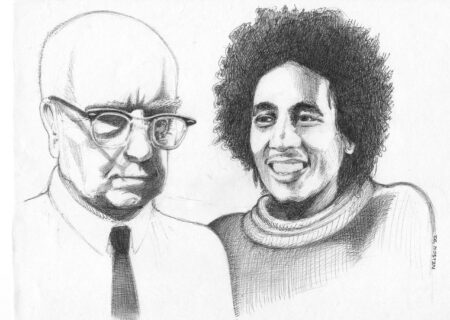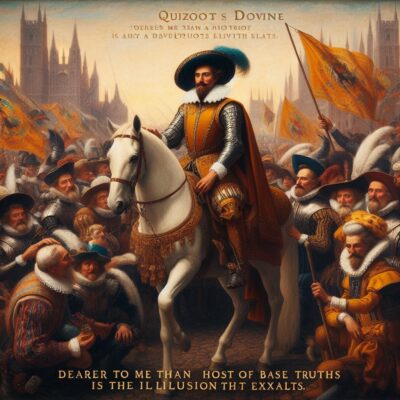Buckminster Fuller & Bob Marley: Trip Hogue

At the time of my gallery installation (1986) I did not know Trip Hogue, III, very well. I still don’t. But I admired him. He seemed to glide from one moment to the next, always at ease with himself. And he loved reggae music.
When I did my gallery installation, I was—and remain so today—a huge fan of both Buckminster Fuller and Bob Marley. Both opened worlds for me. I don’t think I was ever made aware of so much unused brain space as I was in my months-long effort to read Fuller’s, Critical Path. And Bob Marley moved me, along with millions of others with the beauty of his music. Both, I believe, are spiritual figures.
When the shell cracks open
I’m very interested in those moments in a person’s life when the shell of one’s worldview—sometimes the hardened shell—cracks open. The world is suddenly different, perhaps larger than was thought. Both the writing of Buckminster Fuller and the music of Bob Marley did that for me.

The exchange that follows between Buckminster Fuller and Bob Marley was a part of the gallery installation and was dedicated to Mr. Hogue. I don’t know if what Fuller and Marley are saying to one another in their exchange makes sense. I thought so at the time. The point of the exchange, however, was simply to think out loud about reggae music, about what it offers the world.
Don Quixote
Recently, I read for the first time Don Quixote. I had read that Don Quixote is considered by some literary critics the first modern novel and again, by some, the greatest novel. The esteemed literary critic, Harold Bloom, claimed that it was Shakespeare and Cervantes, both writing in the 1600s, who gave us the modern personality. If that is so, then what did Cervantes give us with Don Quixote?

As I read the book, I thought: Don Quixote is sad, funny, and very human. He is a constant problem for himself, a buffoon at times, perhaps even mentally ill. He certainly is not equipped to accomplish his fanciful goals (though he does accomplish one occasionally despite himself). He persists in his quests. That can be said for him. And he wished only to serve causes he believed were honorable and just. It was hard not to be concerned for him and hard not to admire him.
Cervantes, however, was very clear. His book was a send up of knight errantry, not an endorsement of it. He wished to make fun of such foolishness. Even so, I loved the character that Cervantes created. Foolish, perhaps, but a divine fool whose values and vision carried him beyond his limits. “Dearer to me than a host of base truths is the illusion that exalts.” (Alexander Pushkin) That was Don Quixote.

According to Harold Bloom, who wrote the preface to the edition of Don Quixote that I read, “Don Quixote is the originator of the actual Spanish religion, Quixotism.” At the heart of Quixotism, said Bloom, is the notion of “setting the captives free.”
Pursuing utopian ends
To my mind, if this segue is possible, both Buckminster Fuller and Bob Marley are Quixotic figures. Both are driven by the same impulse: to liberate humankind from unnecessary suffering. Marley by means of music that is beautiful, thought-provoking, a call to action, and Fuller through technology that aims to make clear that there is enough to go around. Both convey a sense of urgency, implying that now is the time to pursue utopian ends.
So, this exchange between Fuller and Marley, an odd pairing, I’ll admit. I should add that I’m no expert on reggae music or on Bob Marley. And Fuller’s synergetic geometry left me in the dust. Still, I feel lucky to have come across them. They enriched their time and, I believe, are certain to enrich the time to come with their extraordinary gifts.
A brief dialogue
“You can assume that you are fulfilling your purpose if you are in the process of turning your experience into products and events that bring advantage to others.” — Buckminster Fuller
“Life is one big road with lots of signs… so when you’re traveling through the ruts don’t complicate your mind… Flee from hate, mischief and jealously… don’t bury your thoughts… put your vision to reality.” — Bob Marley

Scene: Two men sit next to a fire in the out-of-doors. One is Marley, the Third World musician and poet; the other is Fuller, the cosmologist. They overlook a valley; in the distance, the ocean. They have just finished eating and are leaning back into a discussion of reggae music.
Fuller: What is this music you call reggae music?
Marley: For us, it is the life beat of Jah, the underlying rhythm of life.
Fuller: And Jah?
Marley: He is the Eternal One, the Pure One, the one above all isms and skisms.
Fuller: The interlocking eternal principles that govern the universe. Perhaps that is a way to think of Jah.
Marley: Perhaps.
Fuller: And how did you and others discover this underlying rhythm?
Marley: I do not know exactly. Perhaps in a dream. Perhaps we listened carefully as we were being born. In a way, it seems like it was always there.
Fuller: It is beautiful. But does it give you an understanding you did not have before?
Marley: That we are all Africans.
Fuller: South Sea Polynesians, that is what I say…
Marley: (interrupting) All one race. That’s what we have learned. If you listen carefully, you know that reggae music is a righteous and pure sound, a spiritual sound. In Jamaica, we say it is the sound of the uphill shank.
Fuller: Uphill means righteous, yes? And shank means dance. And the first step?
Marley: A roof over every head and food on every table. That is a first and necessary step.
Fuller: And education, right? Work for those who want it, the right to express your true interests. Reggae music, then, is the sound of progress toward a just world.
Marley: That is what we say.
Fuller: What then is Babylon?
Marley: Babylon is the down-presser. It is harsh imbalance. It will fall.
Fuller: Is this fall inevitable?
Marley: Who can say? It is a race: the uphill shank versus the greed of Babylon.
Fuller: And reggae music?
Marley: It is our tool, my tool. I use it to bring love to the people.
Fuller: Yes, but…
Marley: (interrupting) Reggae music is sometimes called “the great equalizer”, proof that we have captured beauty in a new form and have given it freely to the world. Before the throne of Solomon we have laid this gift.
Fuller: I often have felt that one measure of a person’s intelligence is the ease with which he or she sees what is unique in others, whatever it is that raises a person above the sphere of the common and the customary. For those interested in the laws of poetic formulation, this is one of the means by which beauty, perhaps even the holy, is perceived.
Marley: Perhaps that is so. You, Sir, are not easy to follow.
Fuller: My point is that the Jamaicans, as representatives of the Third World, have adorned themselves with the distinguishing and holy light of reggae music. The First World Man needs very little energy, or intelligence for that matter, to see that the Third World Man is not common or customary at all, but is distinctive, holy, like himself. Having so seen, the only responsible move, the only self-loving move, is toward unity.
Marley: It is our last-ditch effort. It is our way of saying that we, like you, are shadows of the common soul. If the beauty of reggae music permits you to feel this, to truly feel it, then One Love, One World. That is the truth to which the rhythms of reggae music educate the heart.
Fuller: It is a beautiful thought.
Marley: Tell me, sir, you are a brilliant man, and honest. Do you think that what I am saying and doing will work?
Fuller: No, I do not. As beautiful as it is, I do not think it will be enough. We must meet again. I want to share my work with you. I think that what I am doing will help with the first step, and beyond.
David Thomas, PhD
